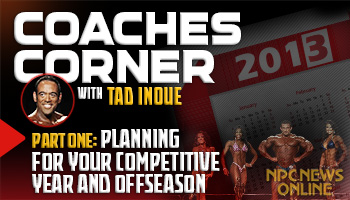I have been a diet coach and in the fitness industry for over 27 years working, competing and helping athletes achieve the best condition possible for contests. Every year I get lots of questions regarding nutrition, contest prep, exercise, and all things fitness related. Here, I will address three typical -but extremely important – questions for the new competitor, or person who is thinking about competing.
Q: “When will I know I am ready to prep and step on stage for the first time?
Many diet coaches will have a different answer than I do, because they only really want contest winners representing them on stage. But this isn’t always in the best interest of the athlete. Since progression and growth in competition is essential to achieving the highest levels of physique development other factors should take precedence. I almost always suggest that an athlete should compete when they feel ready – but feeling ready for most is nebulous. In other words, many don’t feel ready unless they think they can step on a National-level stage and be a contender. This is unrealistic in most cases because the athlete won’t know how he or she compares to others in competition unless they up on stage first. Instead, it is better to choose a show with enough time to prepare for it (diet), and just go for it. Only then will you know what improvements you will need to make in order to be highly competitive.
Remember that competition in the physique world should have value in your life, if it doesn’t then I say don’t compete. Having said that, picking a show is easy with this frame of reference because now you simply need to pick the show that you feel you will have the most fun at for your first time out. Only after this first experience can you properly evaluate and strategically plan for future contests. Once your physique is at a higher level and it seems achievable to earn a pro card or compete at a national level then it will make sense to make that transition.
Q: “When should I start dieting for a contest? How fat should I let myself get in the offseason and how lean do I need to be in order to compete?”
Let’s look at these and tackle it one division at a time:
FIGURE
As an amateur, the typical figure competitor should stay about 12%-14% body fat in the offseason. This enables you to have the most flexibility when you start dieting and allows for a slightly shorter prep. The shorter the prep you have, the better you will most likely look on stage, as long as you are in the proper conditioning for the show. This assumes that you are lean in the offseason and your prep brings you in somewhere around 9% for most.
What does this mean in terms of when should you prep? This can vary from person to person based on your metabolism but in general you should assume one week of prep for every pound of body weight over your ideal stage weight. Some move faster and some move slower, but this is a good average and generally a safe time frame.
BIKINI
Similar to figure in terms of how long you should prepare for a contest and how lean you might stay in the offseason. In general, bikini competitors can hold a little more body fat in the off season and on stage. So adjusting the numbers is simple. Offseason body composition should be somewhere between 14%-16% and stage condition should be somewhere between 10%-11%.
PHYSIQUE
What I have found to be the most successful so far is keeping men in the 8% range in the offseason and the women in the 12%-13% range. For contest the magic number seems to be around 4%-5% bodyfat for men and 7%-8% for women.
BODYBUILDING
Men’s bodybuilding is very easy in this regard. The idea at the local and regional levels is to just be as big and ripped as possible. Once you move to the National level it gets trickier and you really have to strive for a more complete and balanced physique while still maintaining a very muscular and shredded physique. In general, men should keep their body composition in the range of 7%-8% in the offseason and shoot for 3% body fat or lower for competition.
Q: “How often should I compete each season or year?”
So many competitors go nuts the first couple years they compete, often competing in every show they can. This strategy leaves your body very tired, unresponsive and simply over stressed. This kind of competitive strategy also gives you no time for needed improvements throughout the year.
In order to progress upward in competition you have to understand that you can’t take any one competition as a definitive judgment on how good you really are or can be. Remember, you are only as good as the other competitors you stand next to on stage. If you understand this, and you also understand that it is also a sport of opinions, judges opinions that is, then you must realize that you can’t take any one competition’s result too seriously. Don’t get down on yourself if you don’t perform well at a particular show or feel high and mighty if you win one. Remember that on any other day, with another set of judges and another set of competitors, your outcome could be very different. So it is critical that you consistently compete and gain lots of experience with different judges and different competitors so that you can accurately assess yourself each year.
Having said that, your competitive strategy is very important if you intend to make these assessments and improvements each year and progress through the NPC. Again, lets tackle competitive strategy one division at a time. For this discussion, we are going to assume that your goals are to advance as quickly as possible through the amateur ranks:
FIGURE
I suggest picking a six month window where you compete in shows that perhaps culminates in a big show or favored show. This will then give you six months to diet and compete in several shows and six more months to reassess your body and begin to make improvements for the following competitive season.
BIKINI
These athletes have the most flexibility with competing, more so than any other NPC division, because they can often maintain the conditioning needed to compete in longer than other divisions throughout the year. The standards for bikini are tailored more for a softer and slightly less defined physique than figure. I often still recommend a six month window for competitions and suggest a four-to-six month off season.
MEN’S PHYSIQUE
I suggest the same kind of recommendations as I do for figure. Pick shows within a six month window and prep and compete in that window. Again, this leaves the remaining six months off season for the competitor to make valuable improvements.
WOMEN’S PHYSIQUE
I suggest the same six-month window but with the caveat that she try to group her contests as close together as possible so that the prep process isn’t too long and drawn out. Women who need to be extra lean (like women’s physique), in general have less latitude for dieting for long periods of the year without suffering metabolic slow down. The attempt each competitive season should be to try and stress the body with severe dieting for as short of a period of time as possible. Your body will be more responsive to dieting, and you will suffer less of a rebound afterwards.
MEN’S BODYBUILDING
The strategy here can often be as varied as the person, but the best strategy tends to be a four to five month window for dieting and competing and a seven to eight month off season for growth and progress. I don’t recommend competing more than three to four times in a season for most bodybuilders at this early stage of competing. In the advanced stages of competing and development there can be more latitude because there are less needed improvements in order to progress.
 ABOUT TAD INOUE
ABOUT TAD INOUE
Tad Inoue has been a competitive bodybuilder for over 27 years. He has dedicated his life’s work and studies to bodybuilding, figure, physique and bikini competition prep and coaching. Tad has a background in nutrition, exercise sports science, and biochemistry. Tad coaches professional and amateur athletes all over the world, helping each of them prepare for competition and offseason.
For more information about Tad the Diet Coach, visit his website at www.TadtheDietCoach.com or find him on Facebook at https://www.facebook.com/tadthedietcoach or twitter at https://twitter.com/Tadthedietcoach.






